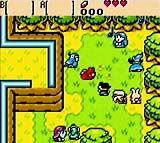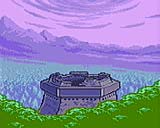 | The Legend Of Zelda: Oracle Of Ages - Review |  |
Time Travel Should Be Left To Chrono Trigger By: Zachary Lewis
| Review Breakdown |
| Battle System |
6 |
| Interface |
4 |
| Music/Sound |
8 |
| Originality |
5 |
| Plot |
3 |
| Localization |
4 |
| Replay Value |
6 |
| Visuals |
9 |
| Difficulty |
Hard |
| Time to Complete |
10-35 hours | | | Overall |  |
| Criteria |
Any major fan of Zelda knows that there are some things that each entry to the saga simply must have present. You don't have a game without Link; you need to have Zelda make a cameo appearance; and, most importantly, Shigeru Miyamoto needs to work directly on it. Much like its' sister title, Oracle of Ages fills in all these gaps, save the last. But, whereas Oracle of Seasons profitted from being developed by other creative minds, Oracle of Ages was punished by it.
Oracle Of Ages is practically identical to any other 2D Zelda game, in that, combat is action and motion based, rather than menu based like the majority of RPGs are. You move around your enemies and attack them with anything from the classic sword to a blowgun that throws magical seeds. Ages deviates from the other games in the saga in a major way, however. Whereas, fighting is the staple event players find themselves in in the rest of the series, Oracle of Ages focusses foremost on your ability to solve traps and puzzles. Although this could have been done well, the way in which Ages forces you to mindlessly practice mini-games until you've memorized everything about each room of a dungeon, it is a far cry from fun. Many of the puzzles involve recurring patterns of color with little or no in-game explanation of how to solve such a puzzle, the constant battle of switching your equipment and trying everything can get very disheartening. The puzzles only get worse as you collect more items, and songs for your Harp of Ages, as they allow you to travel back and forth through time and explore dungeons in both time periods.
 | | A Song Of Time To Rival OoT's | |
Gameplay itself aside, Oracle of Ages is a fairly impressive specimin of what the GameBoy Color is capable of. Featuring anime-style cutscenes and some of the best music possible on the handheld, Ages sits in a class beside only Oracle of Seasons. The in-game graphics themselves are fairly impressive, as well. They cover a broad range of colors and show how much detail Capcom put into making two entirely different versions of the land of Labrynna. Everything down to the smallest change of flowing water in the past, effects the map of the future and can open up areas that were not accessible before. It is probably the massive effort put into making the game good to look at and listen to that makes the game worth playing at all, sadly.
Legend of Zelda games tend to suffer a lot because of their almost laughable plot that is reiterated in each episode. Oracle of Ages and Oracle of Seasons make a passable attempt at changing that, but in the end, they return to the roots of the series and throw in the typical 8 dungeons, 1 main baddie, and a tiny bit of non-linearity. The last point comes from the fact that you can accidentally wander from one dungeon into another and not find out until halfway through the maze that you've entirely missed an earlier area, and hence, a critical item. While this can mean a painfully dangerous walk out of some places, it also gives the player a bit of freedom in their exploration, which is always a good thing. Easily summed up, the story is that you have arrived in the land of Labrynna, somewhere outside Hyrule, and must use your powers as the chosen hero to return time to its' proper course by defeating Veran, the sorceress, and freeing Nayru, the oracle of ages.
 | | Tower Goes Up The Hole | |
Although the design of the sub-menus is identical to that found in Oracle of Seasons, the system seemed very unusable in Ages for a good reason; there's easily twice the amount of item swapping. With a lot of the puzzles using some strange array of items - often more than you can hold at one time - and the amount of times you'll be opening the menu to move things around, the interface gets a bit tedious. Sadly, another area, as crucial as the interface, was not done especially well in this second title, either. Where Seasons had only a very few grammatical errors that made rereading messages necessary, nearly half of the important text areas in Ages are written in such a way as to make a player who likes to skim things, sitting in hot water. This is made all the more horrible because without fully understanding the text displayed at these key moments, you're bound to wander aimlessly back and forth across the two times trying to find the tree that gives you scent seeds, and so forth.
One thing the game has going in its' favor is the replay value. Because the game has at least 2 complete playthroughs worth of story to it, provided you have Oracle of Seasons as well, it deserves a station of honor. When you add the fact that the game is fun in its' own right, regardless of the flaws it has, you have a passable action RPG.
Nintendo has undergone a lot of change since the early days of the NES titles. But, as Zelda changes with the winds of time, so too, must our vision of the saga. With the next episode making a controversial appearance on the GameCube, only time will show us what Link's next mission will be.
|










